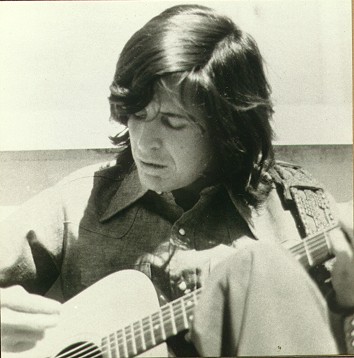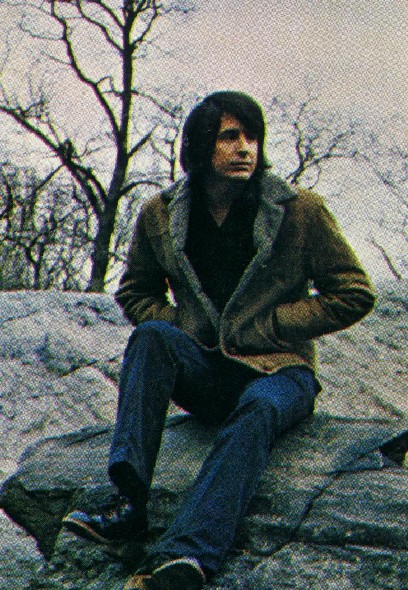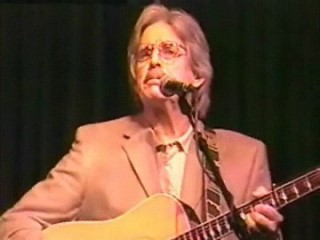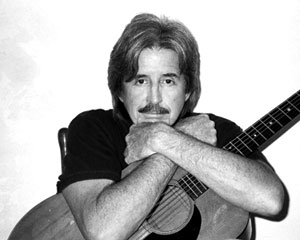Copyright ©2007 PopEntertainment.com. All rights reserved.
Posted:
April 23, 2007.
Coming through the static of the waning days of AM music radio in
the early 1970s was Lobo. Though many mistook him – if they even thought of
him at all – as a vocal group instead of an individual performer, Lobo (real
name: Roland Kent LaVoie) took the money and ran, leaving a brief but beautiful
stamp on an era grooving on anything-goes pop music.
His quickly strung pooka-bead-necklace of hits include the amazing
but unjustly forgotten "I'd Love You To Want Me" and the defiantly passive
aggressive "Don't Expect Me To Be Your Friend." If you weren't yet born
when these joints were hits, get yourself reborn, find 'em and download 'em
(legally, of course). You'll be glad you did.
His signature song, however – the one that struck the chord with
the public – was "Me and You and A Dog Named Boo," which easily, merrily
topped the charts when left-field pop songs like these were welcomed and
invited by hippie and teenybopper alike.
Led Zeppelin and Black Sabbath may have been selling the albums,
but Lobo was moving the singles by the freight train. While other soft
rockers like James Taylor and Gordon Lightfoot were reaping in all the
respect, Lobo was ringing the bell at the top of the charts on a consistent
basis.
His mournful but centered voice made deep, sharp teethmarks in the
bubblegum, and his moment on the charts came and went just as sharply.
Although he is barely remembered in the States, his
Type-B-personality music has found an enthusiastic new audience in
Asia, thanks
to a reissue of his hits there.
 We caught up with Lobo to find the former groovy guy now a retired
grandfather, living the AARP life in
Florida.
Though not exactly the lifestyle we expected, we at PopEntertainment are
dedicated to keeping Lobo's music alive and – like his performing name
(meaning lone wolf in Spanish) howling.
We caught up with Lobo to find the former groovy guy now a retired
grandfather, living the AARP life in
Florida.
Though not exactly the lifestyle we expected, we at PopEntertainment are
dedicated to keeping Lobo's music alive and – like his performing name
(meaning lone wolf in Spanish) howling.
What is up
with you these days?
I am mostly retired now but still tour in
Asia every
now and then. I never was much of a touring act but I do enjoy the Orient.
A retired
Lobo?
For the last thirty years, I have been happily married, invested in
many small real-estate deals, owned orange groves, fished for almost every
fish in the Gulf, maintained a fifteen handicap, bought many German cars,
autocrossed a Porsche, been to hundreds of sport-car races, enjoyed the
slots in many casinos, raised three successful children, lost parents,
helped birth grandchildren, babysat grandkids, done my own yard work,
maintain rental properties, clean my own pool, and always tried to make my
wife happy. And as a way of financing all these activities, gone to the
mailbox to get writer checks... that's how I have been retired. Oh, and yes,
occasionally toured.
Where do you
call home now? Where did you grow up?
Florida
has always been my home.
 How did you
come up with the alias Lobo? Most people – including me – always thought it
was the name of a band and not an individual performer.
How did you
come up with the alias Lobo? Most people – including me – always thought it
was the name of a band and not an individual performer.
Lobo was just one of a long list of names. I had decided not to use
my real name for recording and it was the favorite of my producer, Phil
Gernhard.
What are your
impressions of touring the country? Is it a difficult life?
My impressions of the country are based on personal travels, and
the
USA
is the best place in the world to live. I think touring as a way of life
would be a very hard life.
Do you
remember the first time you heard your music on the radio?
The first time I heard my music on the radio was when I heard "Boo"
on WLS, a huge AM station in
Chicago. It
had 50,000 watts and I was in
Florida
at the time. It was and still is the defining moment of my life.
What was the
soft-rock era of the early seventies like for a performer like yourself? You
seemed to be in the right place at the right time, but did you ever feel the
need to put aside the mellow, heartfelt songs and instead rock out?
I was never really a rocker myself but I love any kind of music
if it is good.
How does it
feel to be loved by fans of songs that you wrote so long ago? How does it
feel to touch the lives of so many people all these years later?
It never ceases to amaze me when I get e-mails from people who
still listen to my music. The strangest part of it is how true to myself I
was as I look back on the way I lived my life. I really am sort of a
loner who has strong feelings about what I believe in. My take on life is
pretty much as the Taoists believe…. life is like floating down a stream and
you should enjoy the ride and not over think every situation. My song "A Big
Red Kite" expresses this feeling.
 In the years
since your string of hits in the early seventies, did you ever explore a new
career, or were you always writing and performing?
In the years
since your string of hits in the early seventies, did you ever explore a new
career, or were you always writing and performing?
No… It’s very hard to relate to any other career because sooner or
later someone would figure out who you were or are (I still can't figure if
I was or if I still am Lobo) and then your relationship with people would
change. Yes I still write and record.
You had a
hand in the success of Jim Stafford's "Spiders and Snakes" and "Wildwood
Weed." What was your association with Jim and do you guys keep in touch?
Jim was from my home town of
Winter Haven,
Florida. He called me to ask if he could play some songs for me that he had
written. He did and we got him a deal with Curb [Records].
Regarding
your MCA hit, "Where Were You When I Was Falling In Love?": it never appears
on any compilation CD, and there were several. Why is that?
I don't have any idea. I didn't write it so don't have any
information on it.
What is your
opinion of popular music today?
The music part is good. The non-music – rap and hip hop – I hope
will soon self destruct.
 How is the
recording industry different now as opposed to when you were creating hit
singles?
How is the
recording industry different now as opposed to when you were creating hit
singles?
The biggest difference is this: in the seventies you wrote or were
given a hit song and a single was sent to radio. If
it was a hit, you put
out an album. Today, an album, a video and millions of dollars go into an
act at the onset. There are a lot of songs on the radio that are not hits
but mere advertisements for the CD.
Who are your
major influences on your music and performing?
The Beatles on the music. No one on performing.
If you
weren't a singer/songwriter/performer, what would you be doing with your
life?
"I'd live in a van down by the river" to quote Chris Farley.
Check out
more about Lobo -- and what makes you think you shouldn't? -- at
www.fansoflobo.com.
Email
us Let us know what you
think.
Features
Return to the features page.

Copyright ©2007 PopEntertainment.com. All rights reserved.
Posted:
April 23, 2007.